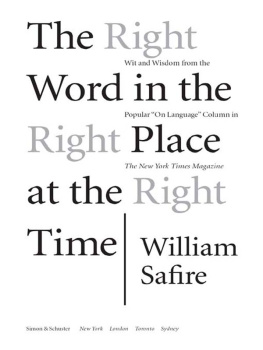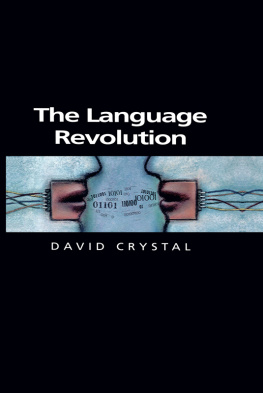

SIMON & SCHUSTER
Rockefeller Center
1230 Avenue of the Americas
New York, NY 10020
Copyright 2004 by The Cobbett Corporation
Grateful acknowledgment is made to The New York Times for permission to reprint On Language columns by William Safire from the January 2, 2000, to June 30, 2003, issues of The New York Times Magazine, including one column dated October 19, 2003.
Copyright 2000, 2001, 2002, 2003 by The New York Times Company.
Reprinted by permission. All rights reserved.
Grateful acknowledgment is extended to Louise Espy for permission to include Willard Espys poem To My Greek Mistress.
All rights reserved, including the right of reproduction in whole or in part in any form.
S IMON & S CHUSTER and colophon are registered trademarks of Simon & Schuster, Inc.
Library of Congress Cataloging-in-Publication Data
Safire, William, date.
The right word in the right place at the right time: wit and wisdom from the popular On language column in The New York times magazine / William Safire.
p. cm.
1. English languageUsage. 2. English languageStyle. I. New York times magazine. II. Title.
PE1421.S2334 2004
428dc22 2004045355
ISBN-13: 978-1-4165-8740-8
ISBN-10: 1-4165-8740-3
Visit us on the World Wide Web:
http://www.SimonSays.com
F OR J ACQUES B ARZUN ,
with thanks for all his comments herein.
We must make up our minds what we mean by usage. If it be defined merely as the practice of the majority, we shall have a very dangerous rule affecting not merely style but life as well, a far more serious matter.
Q UINTILIAN , first century AD
I NTRODUCTION
We will come to sodomy in a moment. To stagger together through todays column about grammatical possessiveness, you and I must agree on the difference between a gerund and a participle.
Take the word dancing . It starts out as a form of a verb: Look, Ma, Im dancing ! When that word is used as an adjective to modify a nounlook at that dancing bear!its called a participle.
But when the same word is used as a nounI see the bear, and its dancing isnt so hotthen the word is classified as a gerund. (From the Latin gerundum, rooted in gerere, to bear, to carry, because the gerund, though a noun, seems to bear the action of a verb.)
We give the same word these different names to tell us what its doing and what its grammatical needs are. Two great grammarians had a titanic spat in the 1920s over the use of the possessive in this sentence: Women having the vote reduces mens political power. H.W. Fowler derided what he called the fused participle as grammatically indefensible and said it should be Womens having; Otto Jespersen cited famous usages, urged dropping the possessive and called Fowler a grammatical moralizer.
Comes now Supreme Court Justice Antonin Scalia with the latest manifestation of this struggle. An Associated Press account of his stinging dissent in Lawrence v. Texas, in which the Court struck down that states anti-sodomy law, quoted Scalia out of context as writing, I have nothing against homosexuals, which seemed condescending. His entire sentence, though, was not: I have nothing against homosexuals, or any other group, promoting their agenda through normal democratic means.
Note the lack of apostrophes after homosexuals and group to indicate possession; Fowler would have condemned that as a fused participle. Such loosey-goosey usage from the conservative Scalia, of all people?
When I composed the passage in question, the justice informs me, I pondered for some time whether I should be perfectly grammatical and write I have nothing against homosexuals, or any other groups, promoting their agenda, etc. The object of the preposition against, after all, is not homosexuals who are promoting, but rather the promoting of (in the sense of by ) homosexuals.
I have tried to be rigorously consistent in using the possessive before the participle, Scalia notes, when it is the action, rather than the actor, that is the object of the verb or preposition (or, for that matter, the subject of the sentence).
But what about his passage in Lawrence, in which he failed to follow Fowler and fused the participle?
I concluded that because of the intervening phrase or any other group, writing homosexuals with the apostrophe indicating possession(and hence any other groups) would violate what is perhaps the first rule of English usage: that no construction should call attention to its own grammatical correctness. Finding no other formulation that could make the point in quite the way I wanted, I decided to be ungrammatical instead of pedantic.
But his attempt to be a regular guy backfired. In a jocular tone, Scalia observes: Godwhom I believe to be a strict grammarian as well as an Englishmanhas punished me. The misquotation would have been more difficult to engineer had there been an apostrophe after homosexuals. I am convinced that in this instance the AP has been (unwittingly, I am sure) the flagellum Dei to recall me from my populist, illiterate wandering. (You will note that I did not say from me wandering.)
My does beat me before that gerund wandering . Robert Burchfield, editor of the third edition of Fowlers Modern English Usage, writes, The possessive with gerund is on the retreat, but its use with proper names and personal nouns and pronouns persists in good writing.
Now lets parse Scalias self-parsing. In his refusal to say from me wan-dering, wandering is a gerund. When a personal pronoun comes in front of a gerund, the possessive form is called for: say my, not me . This avoidance of a fused participle makes sense: you say about the above-mentioned bear I like his dancing, not I like him dancing, because you want to stress not the bear but his action in prancing about.
In Scalias dissent in the Texas sodomy case, promoting is a gerund, the object of the preposition against . His strict-construction alternative, using apostrophes to indicate possessionagainst homosexuals, or any other groups, promotingis correct but clunky. He was right to avoid it, and is wrong to castigate himself for eschewing clunkiness.
There would have been another choice, however: put the gerund ahead of the possessors. Try this: I have nothing against the promoting of their agenda by homosexuals, or by any other group, through normal democratic means. That would not only avoid the confusing apostrophes, but follows I have nothing against with its true object, the gerund promoting and would make it impossible for any reporter to pull out a condescending I have nothing against homosexuals.
Theres always a way out.
Regarding your proposed solution to my gerundial problem (to wit, I have nothing against the promoting of their agenda by homosexuals, or by any other group, through normal democratic means): It is so obvious that of course I considered it. Two problems. (1) I do not like to have a relative pronoun preceding its antecedent, as in the promoting of their agenda by homosexuals. (2) More importantly, English remains a language in which emphasis is largely conveyed by word order, and the emphasis in my sentence was upon homosexuals promoting, not upon (where your alternative places it) the promoting by homosexuals. Surely you can sense the difference.
Justice Antonin Scalia
Supreme Court of the United States
Washington, D.C.

A










 A
A